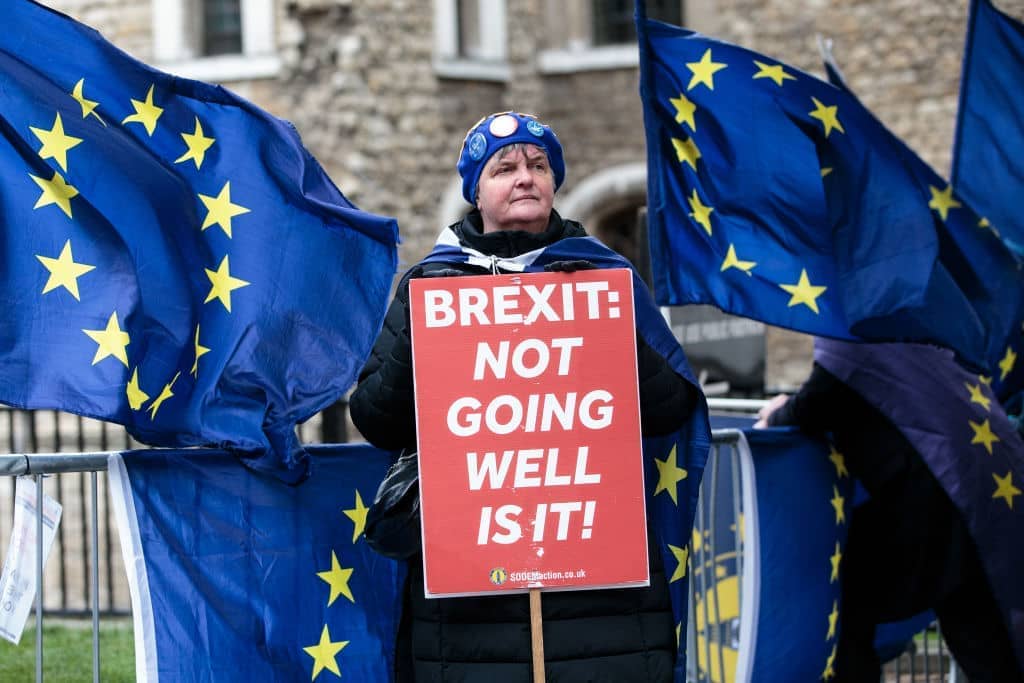It is good for historians to take the plunge into political writing, using their knowledge where they can to illuminate our present predicament. I declare an interest: I have tried it myself, on the other side of the debate. One has to be open with the reader as to one’s intentions and willing to expose one’s own opinions to the test of evidence. Otherwise, the result is something like these intriguingly confused and confusing books, which are really polemics against Brexit while purporting to be something else. Though very different in style and assumptions, their prejudices lead to the same intellectual dead end.
Bernard Porter is a distinguished historian of immigration and imperialism and the author of an excellent book demonstrating that few people in Britain bothered much about the empire – heresy in today’s climate of decolonisation.
His present style is a fruity hybrid of Queen Victoria and Mr Podsnap, with lavish use of italics, brackets and scare quotes. It reads as though it was dictated and never corrected. Perhaps it was. Porter disarmingly pleads that during lockdown he was stuck in Sweden, his present home, with no access to books or notes, but Bloomsbury could surely have edited out repetitions, errors and contradictions.
Though his knowledge of the complexities of imperial history means that he has little time for ‘statue spoilers’, his ‘lessons for patriots’ constitute a stern diet of debunking to deflate patriotic (or as he writes ‘patriotic’) histories of Britain (or ‘Britain’). So the tone is generally negative. He is of course sniffy about Churchill and finds it difficult to understand working-class patriotism.
Brexiteers, when not moved by ‘plain stupidity’, are fascists
Britain was philistine: ‘European visitors… didn’t generally come to admire its painting.’ That would have surprised Delacroix, criticised for his ‘English’ style, and Monet, ‘the French Turner’. First world war ‘conchies’, he says, were imprisoned (in fact few were). Chamberlain was right about appeasement, as we would have lost the war in 1938 (a judgment few specialists now accept). And it was really won by Russia anyway (a view that ignores recent research). On a more positive note, he admires ‘the almost saintly Jeremy Corbyn’, and repeatedly assures us that Marx was right. Debunking aside, his overarching theme is that Britain is pathologically obsessed by its history.
He makes strenuous efforts to be, or at least to appear, even-handed, which means long sentences with thickets of conditional sub-clauses. When he gets on to Brexit, however, the view becomes crystal clear, despite the verbal camouflage. He loathes Eton, Boris and Jacob Rees-Mogg (not really ‘top notch class-wise’). Brexiteers, when not moved by ‘plain stupidity’, are fascists. Typically, he hedges: fascism is perhaps ‘not a very exact term’, but ‘more and more commentators’ (such as Hillary Clinton) discerned ‘features of proto-fascism’. Some may read this as scrupulous attention to accuracy; others as mud-slinging by proxy.
Hannah Rose Woods comes from a recent generation, and her book is very different yet intriguingly similar. There is nothing of the Old Left about it, and passing remarks suggest she applauds ‘statue spoilers’. Its pedigree is the ‘cultural turn’, which at its least demanding means thinking up an abstract theme and embroidering it with examples. Woods also adopts the novelty of writing history backwards, beginning in 2021 and ending up in the 16th century. I don’t think it makes much difference, as the simple argument is the same from end to beginning: ‘Nostalgia’ is the dominant characteristic of British (mostly English) culture.
‘It can seem as if Britain is a nation obsessed by history,’ she writes, echoing Porter. It certainly can seem that if the author chooses to demonstrate it by forcing a wide variety of phenomena into a Procrustean bed of nostalgia. Protestantism – nostalgia for primitive Christianity. Catholicism – also nostalgia. Admiration for the classics: nostalgia. Building Palladian country houses, ditto – and Gothic Revival ones too. Modern art and sexual liberation have nostalgia lurking somewhere. The Green movement is somehow omitted. Almost every reference to the past is labelled nostalgia. The list seems endless, as eventually does this harping on a single chord.
Individual parts of the book are quite lively and though much of it is familiar (Horace Walpole, William Morris, John Ruskin, Edward Carpenter et al.) not all of it is. The best part is on late-19th-century urban fears, seemingly drawing on the author’s PhD dissertation. But when nostalgia is so stretched as a concept that it seems to explain everything, including opposites, it explains nothing.
The deepest intellectual trap Woods and Porter slide into is ‘exceptionalism’ – the idea that Country A is different from every- where else. Well-bred historians shun exceptionalism and, knowing that, our two authors pay lip service to the orthodoxy. But both need exceptionalism if their arguments are to hold any water: we have to accept a range of attitudes as uniquely or characteristically British even though they are widely shared transnationally.
Porter simply assumes that Britain is uniquely obsessed with its past. Woods similarly assumes that Britain or England is uniquely nostalgic. Neither tries to argue the case. How could they? One does not need to know much about other European countries to realise that interest in and emotions about the past are universal. Protestantism, Classicism, Romanticism, ruralism, the Gothic Revival and so on are not in any meaningful sense British. Limiting oneself to British examples cannot disguise that obvious fact. The European Union itself is founded on obsessions with the past. But unless our authors insist that Britain is the exception, their explanations of Brexit make no sense.
For their proposition is that Brexit was nostalgia: for empire and/or the second world war – hardly an original thought. As Wood assures us, ‘many observers’ agree with this, including Vince Cable, Afua Hirsch, David Olusoga, Fintan O’Toole and various Americans. Some readers will be impressed. Like most Remainer polemicists, Woods and Porter have little if anything to say about Europe or the EU. It’s easy to regard Britain as exceptional if you ignore everywhere else. In fact, British attitudes to the EU in 2016 were typically European: about the same as Holland and Germany, less Eurosceptic than France, much less so than Greece. The ‘exception’ is that the British were given a vote and Remainers failed to reverse it.
Could it be that Brexit had something to do with the problems of the EU rather than the unique peculiarity of the British? The European ‘project’ has been losing popular support all across Europe since the 1990s. Perhaps ‘nostalgia’ and ‘obsession with the past’ have been breaking out in every country. Or perhaps more relevant are economic failure, unemployment and unaccountability. If we follow the historical approaches taken in these two books, we shall never know.
This book review appears in the forthcoming Spectator, out tomorrow







Comments